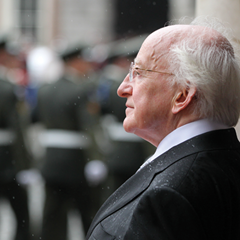Michael D Higgins on redefining Irishness
 President Michael D Higgins speaks to Meadhbh Monahan about his vision of the republic by 2016 and the actions needed to create a radically inclusive citizenship.
President Michael D Higgins speaks to Meadhbh Monahan about his vision of the republic by 2016 and the actions needed to create a radically inclusive citizenship.
A “huge debate” is needed in order to “redefine Irishness” and create the concept of a ‘real republic’ that is “built on ethics and intergenerational solidarity,” President Michael D Higgins tells eolas.
Following an address to the ICTU women’s biennial conference in Belfast, where he hit out at those who caused the economic crash through their “dangerous obsession” with personal wealth and material possessions, the President insists that “acquisitive individualism” must be replaced by a communal society which is built on ethics.
He points to the Thomas Davis lecture series (first broadcast in 1994 and re-broadcast in 2009 to commemorate the 90th anniversary of the first Dáil) which examined the development of the idea of an Irish republic. “The word ‘republic’ has to be something that is inclusive, that is in fact built on ethics and inter-generational solidarity because it isn’t about the Ireland you want for one generation, but the responsibilities that are sustainable [for many generations],” he tells eolas.
Asked about his vision for a real republic by 2016 and whether it might be a more socialist republic, the President responds: “I think it is the language that will matter.” Referring to the fact that his father fought for the republican anti-treaty side in the War of Independence while his uncle who raised him took the pro-treaty side, he adds: “I take a contextual view of it.”
The President contends that while Ireland in the 1890s was “full of idealism”, it became a very conservative society after the 1916 uprising. “For example, the idea of the Proclamation itself [and] the ideals in the democratic programme for the first Dáil [were conservative],” he believes.
During his address to trade unionists, Mr Higgins called for a change to the shape of the economy so that “sustainability and social cohesion are given as much priority as efficiency and competitiveness.”
Irish people have the right to “curse” this “dark period in our economic history” but they also need to “light the candles of hope that will help us to navigate a path towards a better and fairer future,” he told delegates.
Rather than viewing the individual as “being no more than a passive consumer of goods and services, and living in disaggregated isolation,” a “far more liberating and life-enhancing vision” would be one whereby the citizen “actively participates in a society in which he or she enjoys personal rights and discharges responsibilities in a shared community.”
That vociferous speech came on the back of a hard-hitting address to the National University of Ireland at Dublin Castle in January. On that occasion, the former university lecturer in sociology and politics derided the “culture of individualism” that led to the economic downturn in Ireland. The traditional “warmth of a community of learning” has been “put under threat from the underestimated aggression” that comes from “extreme individualism,” he said.
Universities were encouraged to challenge the failed paradigms of “the connection between economy and society, ethics and morality, democratic discourse and authoritarian imposition.” The President told the gathering that now is the time for intellectuals to “offer alternatives that offer a stable present and a democratic, liberating and sustainable future.”
In recognition of the fact that many graduates now face uncertain futures, the President tells eolas that his priorities include holding a seminar called ‘Being young and Irish’. It was initially to be called ‘Being young in Ireland’ but was changed because “many Irish have left abroad.” The second seminar is “very important” as is will focus on ethics in every aspect of life.
“There is a very fine response. People are very supportive of real ideas,” the President reflects.
When pressed about his other priorities, Higgins answers: “What has been very interesting is the way in which [my] idea of having a radically inclusive citizenship in a creative society has gone past inauguration day and has made its way into a number of other people’s discourse.”
He continues: “That radically inclusive citizenship means that I have given priority in the first years of the presidency to those groups to which a visit from the presidency would be of most value. In relation to the creative society I have stressed that this isn’t just creative at the aesthetic end of things: the arts and culture area I would know very well, but in every aspect of life from child rearing to international diplomacy.”
The President wants to “create an Irishness that we might be proud of.”
“I would argue our reputation abroad has been affirmed by peace keepers, by international artists, by cultural workers and so forth,” he says. “The Irishness that transpired in the last decade was one that moved a certain kind of personalism or individualism into an acquisitive individualism and there was a downside to that.”
The President ultimately hopes to stimulate a nation-wide debate that could help create “an Irishness appropriate for a real republic.”





